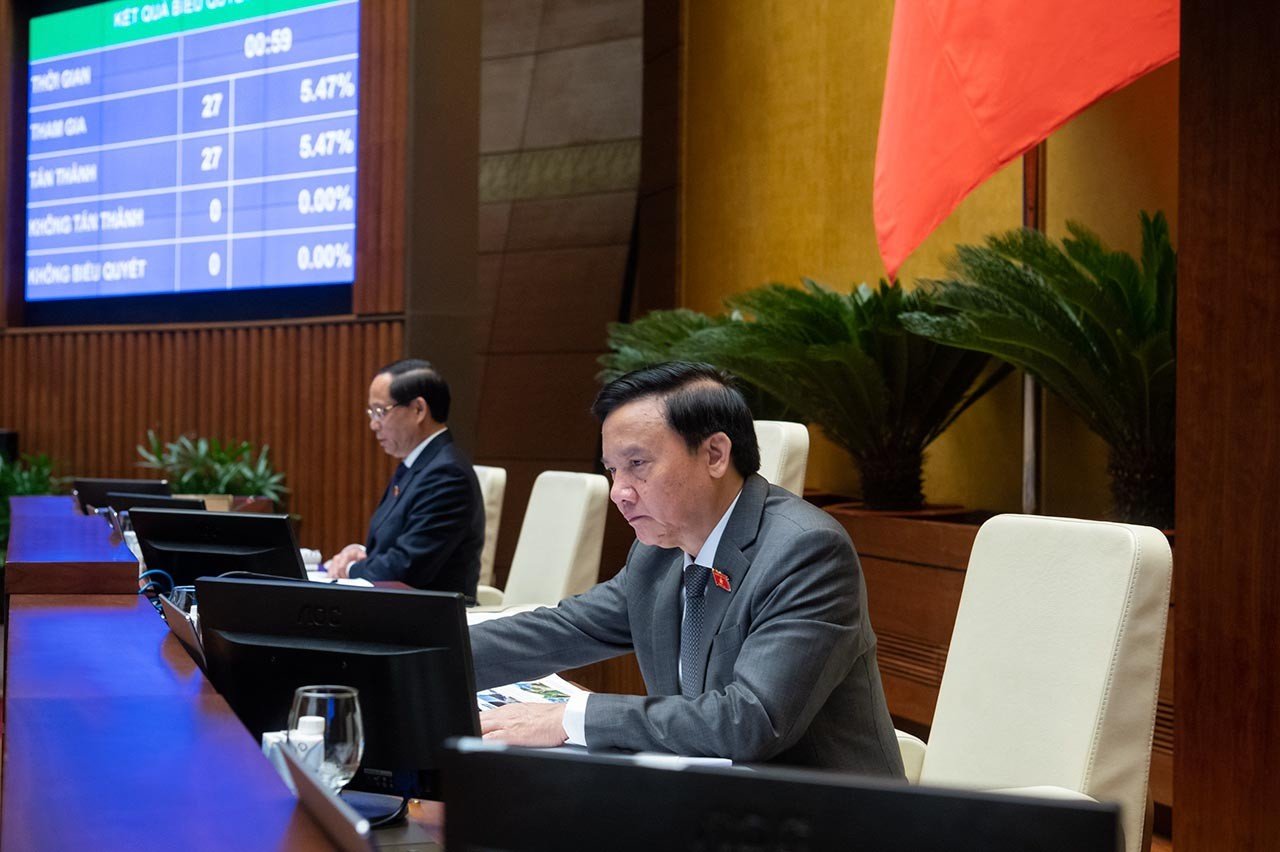 |
| National Assembly deputies voted to pass the Law on Telecommunications (amended). |
After listening to the Chairman of the National Assembly's Committee on Science , Technology and Environment, Le Quang Huy, present the Report on explanation, acceptance and revision of the draft Law on Telecommunications (amended), the National Assembly voted to pass this draft law.
The electronic voting results showed that 468 delegates participated in the vote in favor (accounting for 94.74%). Thus, with the majority of delegates participating in the vote in favor, the National Assembly officially passed the Law on Telecommunications (amended).
Previously, presenting a summary report on the explanation and acceptance, Chairman of the National Assembly's Committee on Science, Technology and Environment Le Quang Huy said that on October 25, 2023, the National Assembly discussed in the Hall the draft Law on Telecommunications (amended), with 11 National Assembly deputies speaking and 01 National Assembly deputy sending written comments.
Based on the opinions of the National Assembly Deputies, the National Assembly Standing Committee (NASC) directed the Reviewing Agency to closely coordinate with the Drafting Agency and relevant agencies to absorb, revise, and carefully review the content and legislative techniques. On November 23, 2023, the NASC issued a full Report No. 694/BC-UBTVQH15 explaining, absorbing, and revising the draft Law on Telecommunications (amended).
Is basic telecommunications service over the Internet a type of telecommunications service?
Regarding basic telecommunications services on the Internet (Clause 8, Article 3 and Article 28), Chairman of the National Assembly's Committee on Science, Technology and Environment Le Quang Huy said that there were opinions requesting clarification on whether basic telecommunications services on the Internet are a type of telecommunications service or not; if so, it must meet all the obligations of traditional telecommunications services; if not, it needs to be redefined to avoid confusion in understanding, applying and enforcing the law.
Regarding this issue, the Standing Committee of the National Assembly would like to report as follows: This content was also reported by the Standing Committee of the National Assembly to the National Assembly at the meeting on October 25, 2023. Basic telecommunications services on the Internet provide features equivalent to basic telecommunications services (messages, voice calls, video conferencing), providing the main function of sending, transmitting, and receiving information between two or a group of people using telecommunications services on the Internet. Similar services need to be regulated by the same Law, ensuring equality between enterprises providing basic telecommunications services on the Internet and enterprises providing traditional telecommunications services.
In the world , many countries have regulated this service as a telecommunications service and are managed according to telecommunications laws.
Therefore, basic telecommunications services on the Internet are a type of telecommunications service, regulated in the Telecommunications Law.
However, this service is characterized by the fact that the service provider does not own the network infrastructure and is not allocated telecommunications resources, so the draft Law has been revised in the direction of regulating it according to the "light management" method, only having to comply with some regulations on obligations as in Clause 2, Article 28 of the draft Law.
With the above analysis, the Standing Committee of the National Assembly finds that the name “basic telecommunications service on the Internet” has shown the characteristics of this service. Therefore, please keep this name as in the draft Law.
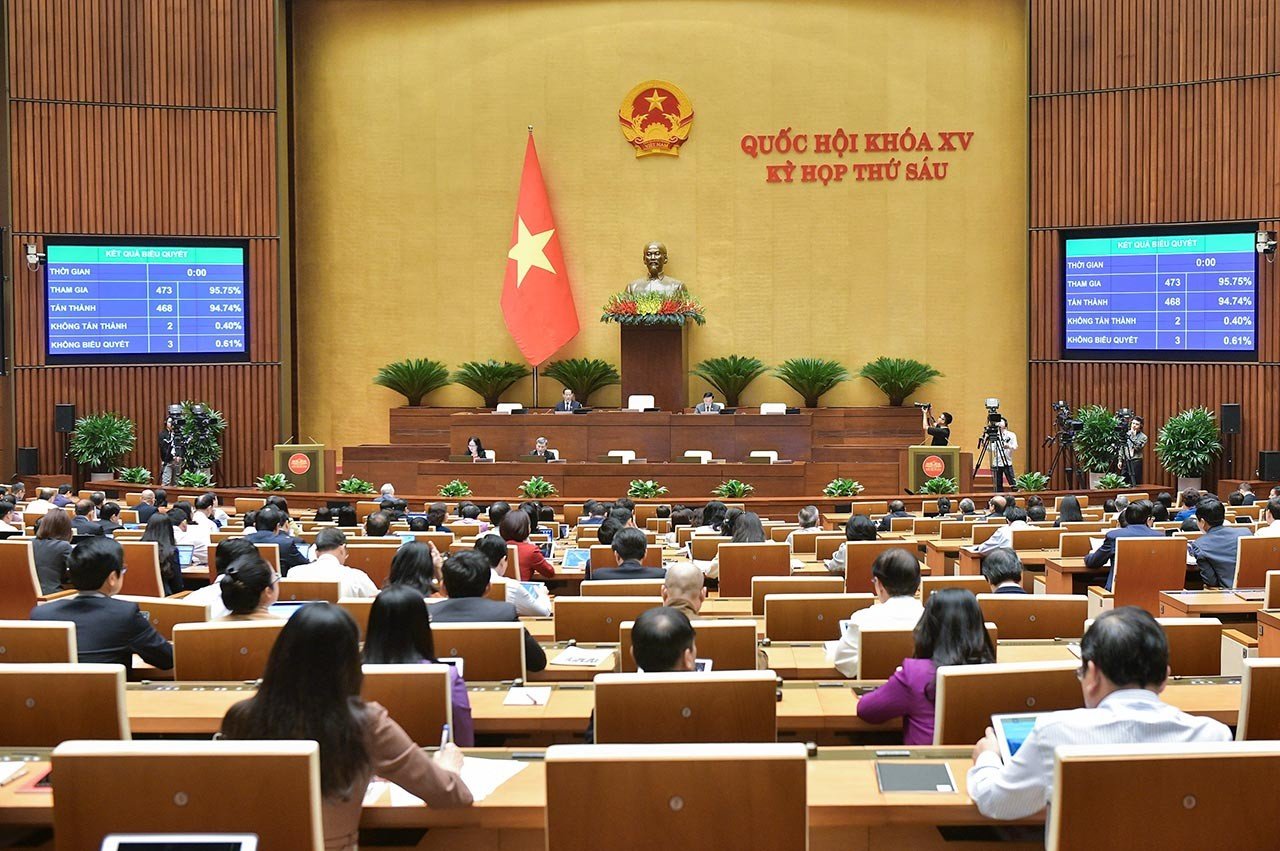 |
| The National Assembly officially passed the Law on Telecommunications (amended). |
Control of deposit for participation in auction of telecommunications numbering
Explaining about telecommunication resources (Chapter VI), there are opinions suggesting that telecommunication service subscriber numbers should also be divided into groups to properly assess their value, minimize the cases of deposit abandonment during auction and assign the Ministry of Information and Communications to provide detailed regulations.
Proposing to explain measures to control the deposit of participation in auction of telecommunication numbers, the Standing Committee of the National Assembly proposed to keep the regulations on auction of telecommunication numbers as in the draft Law. The reason is that the assessment to classify subscriber numbers with special structures by value is difficult to implement because it depends on many factors such as the perception of users, regions, and areas.
The issue of auction winners giving up their deposit is currently occurring in the auction of various types of auctioned assets such as land, car license plates, etc. The 2016 Law on Property Auction stipulates that auction winners are responsible for fully paying the purchase price of the auctioned asset as agreed in the auctioned asset sale contract (Point b, Clause 2, Article 48); giving up the deposit is a violation of the agreement in the auctioned asset sale contract and is subject to civil law.
In addition, the draft Law on Telecommunications (amended) stipulates an appropriate starting price when participating in auctions to limit barriers and create conditions for all organizations and individuals who want to participate in auctions. However, this provision also leads to certain risks such as the situation of abandoning deposits.
There is a proposal to clearly stipulate the auction method according to the ascending bid method for the auction of the right to use the telecommunications number warehouse and the Vietnamese national domain name ".vn", Chairman of the Committee for Science, Technology and Environment Le Quang Huy stated that, studying and absorbing the opinions of the National Assembly Deputies, the Standing Committee of the National Assembly has directed to amend Clause 6, Article 50 of the draft Law in the direction of adding regulations on the method and form of auction of telecommunications number warehouse and the Vietnamese national domain name ".vn" to be carried out in accordance with the provisions of the law on property auction to be consistent with Article 58 of the Law on Property Auction on the ascending bid method.
Is there a network number charge?
The National Assembly Standing Committee also accepted and explained the request to clarify whether the collection of network number registration fees by international organizations affects Vietnamese organizations and enterprises; whether Vietnam collects network number registration fees; if so, it is recommended to conduct a supplementary impact assessment.
The Standing Committee of the National Assembly found that this is new content compared to the draft Law submitted by the Government, giving rise to financial obligations (although the revenue is not large), so it is necessary to carefully review and assess the impact.
Through research, review, and impact assessment, the Standing Committee of the National Assembly found that the collection and payment of registration fees and network number maintenance fees are mandatory obligations, implemented in accordance with international regulations.
If Vietnam does not have this regulation, Vietnamese telecommunications organizations and businesses using many network numbers will have difficulty registering and using network numbers, which will affect the network operations and services of businesses in the future.
As of October 2023, out of 614 Vietnamese telecommunications organizations and enterprises that have registered to use network numbers, only 04 enterprises are subject to paying network number usage fees according to APNIC's new policy.
The collection, payment and management of registration fees and network number maintenance fees will be implemented similarly to that of Internet addresses (which has been implemented up to now).
The collection levels, collection and payment subjects, exemption and reduction regimes for network number fees and charges will be specified in the guiding circular issued by the Minister of Finance under the authority prescribed in Clause 3, Article 19 of the Law on Fees and Charges.
The Ministry of Information and Communications (the agency in charge of granting and allocating network numbers) will be responsible for organizing the collection of registration fees and network number maintenance fees.
The entity responsible for paying fees is the organization or enterprise registering to use the network number in Vietnam. 100% of the fee for registering to use the network number is paid to the state budget.
From the above analysis, studying and absorbing the opinions of National Assembly Deputies, the draft Law has stipulated the payment of fees for maintaining the use of Internet resources; fees for allocating and granting Internet resources at Point d, Clause 9, Article 50 (thus including the addition of fees for registering to use network numbers, fees for maintaining network numbers) and Clause 3, Article 71 of the draft Law. Such regulations are consistent with the Law on Fees and Charges, the Law on Tax Administration.
Source


![[Photo] Immerse yourself in the colorful musical world of “Secret Garden Live in Vietnam”](https://vphoto.vietnam.vn/thumb/1200x675/vietnam/resource/IMAGE/2025/10/18/1760805978427_ndo_br_thiet-ke-chua-co-ten-41-png.webp)

![[Photo] Closing ceremony of the 18th Congress of Hanoi Party Committee](https://vphoto.vietnam.vn/thumb/1200x675/vietnam/resource/IMAGE/2025/10/17/1760704850107_ndo_br_1-jpg.webp)
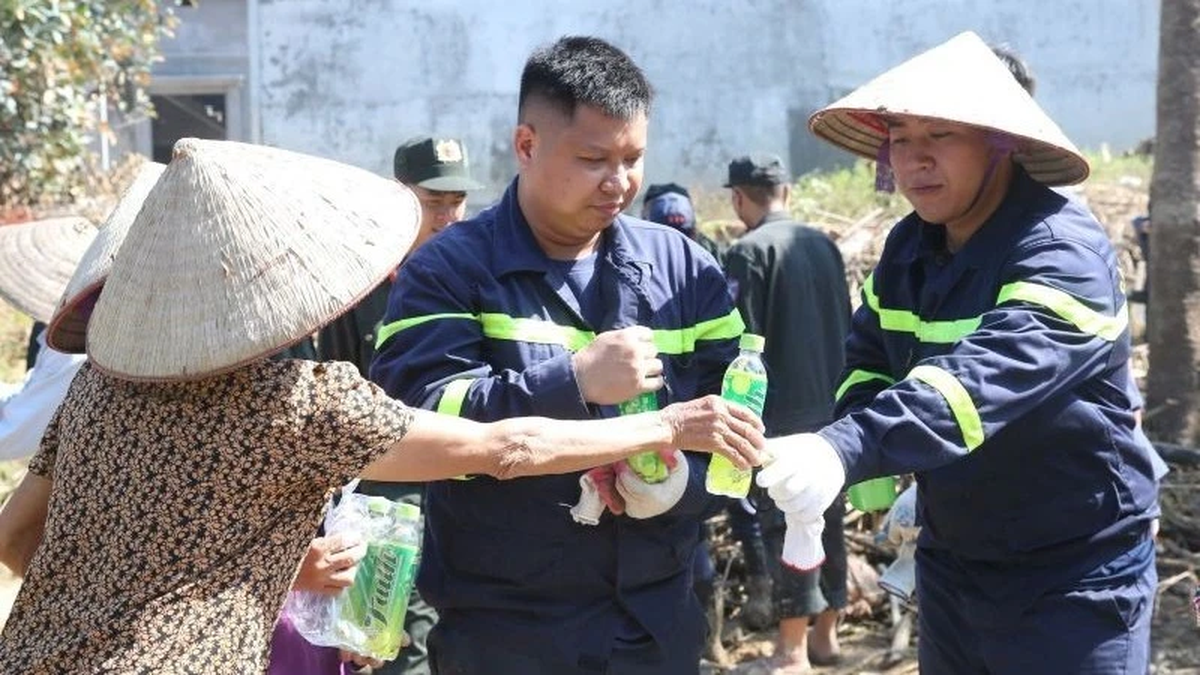
![[Photo] General Secretary To Lam attends the 95th Anniversary of the Party Central Office's Traditional Day](https://vphoto.vietnam.vn/thumb/1200x675/vietnam/resource/IMAGE/2025/10/18/1760784671836_a1-bnd-4476-1940-jpg.webp)
![[Photo] Collecting waste, sowing green seeds](https://vphoto.vietnam.vn/thumb/1200x675/vietnam/resource/IMAGE/2025/10/18/1760786475497_ndo_br_1-jpg.webp)
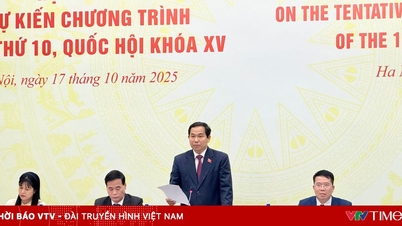


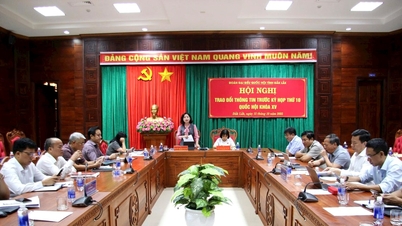

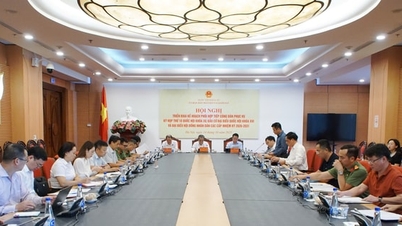

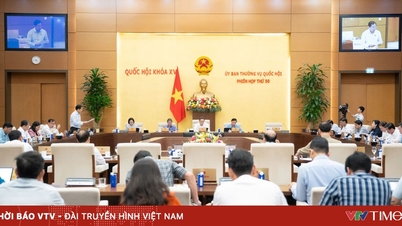
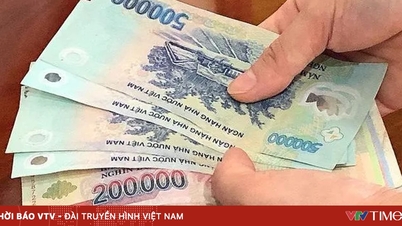














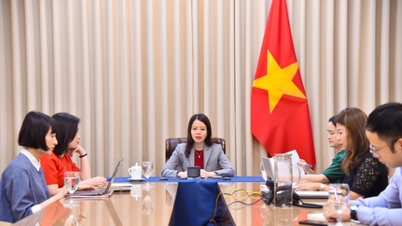
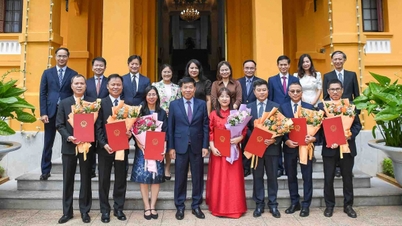


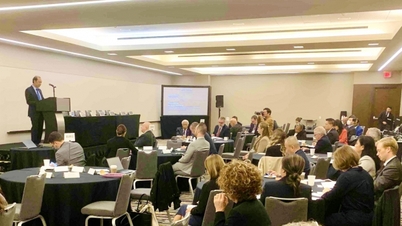
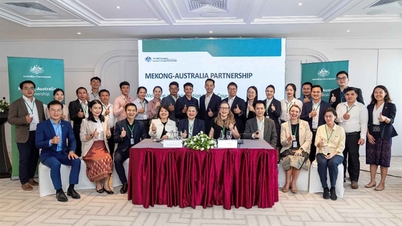

































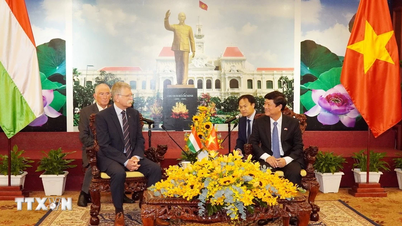



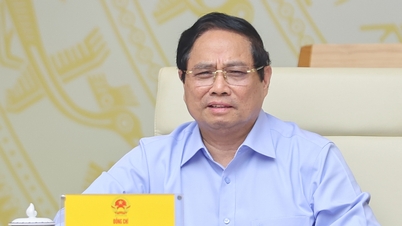
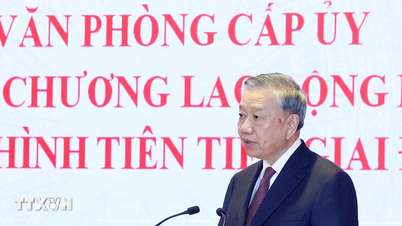





























Comment (0)